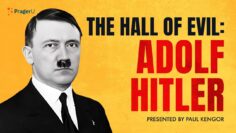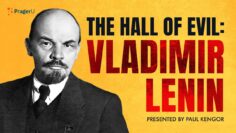
Did FDR End the Great Depression? | 5 Minute Video
Did FDR help end the Great Depression? Did his New Deal improve an otherwise hopeless economy? Lee Ohanian, Professor of Economics at UCLA and consultant to the Federal Reserve Bank of Minneapolis, explains.
Donate today to PragerU! http://l.prageru.com/2ylo1Yt
Have you taken the pledge for school choice? Click here! https://www.schoolchoicenow.com
Get PragerU bonus content for free! https://www.prageru.com/bonus-content
Download Pragerpedia on your iPhone or Android! Thousands of sources and facts at your fingertips.
iPhone: http://l.prageru.com/2dlsnbG
Android: http://l.prageru.com/2dlsS5e
Join Prager United to get new swag every quarter, exclusive early access to our videos, and an annual TownHall phone call with Dennis Prager! http://l.prageru.com/2c9n6ys
Join PragerU’s text list to have these videos, free merchandise giveaways and breaking announcements sent directly to your phone! https://optin.mobiniti.com/prageru
Do you shop on Amazon? Click https://smile.amazon.com and a percentage of every Amazon purchase will be donated to PragerU. Same great products. Same low price. Shopping made meaningful.
VISIT PragerU! https://www.prageru.com
FOLLOW us!
Facebook: https://www.facebook.com/prageru
Twitter: https://twitter.com/prageru
Instagram: https://instagram.com/prageru/
PragerU is on Snapchat!
JOIN PragerFORCE!
For Students: http://l.prageru.com/29SgPaX
JOIN our Educators Network! http://l.prageru.com/2c8vsff
Script:
Did President Franklin Roosevelt’s New Deal economic policies pull the country out of the Great Depression? My research clearly suggests that the answer, contrary to popular belief, is no. In fact, the New Deal made matters worse.
Let me explain.
The centerpiece of Roosevelt’s New Deal plan to fix the economy was the National Industrial Recovery Act, or NIRA, which the President announced with great fanfare in June of 1933.
FDR believed that he could use the government to artificially raise both prices and wages. It would work like this: higher prices would raise profits—that makes business happy; and higher wages would raise income—that makes workers happy.
More profits for business means more money to hire new workers. Higher wages for workers means more money to buy consumer goods. A virtuous cycle is set into motion and the economy improves rapidly.
But here’s what FDR missed: Artificially raising wages also raises labor costs. And when labor costs go up, business hires fewer workers or no workers at all, especially in a difficult economic environment. Meanwhile, artificially raising prices reduces demand for the obvious reason that people buy less of something when its price goes higher.
So, why did FDR do this?
FDR based his New Deal policy largely on what happened during World War I, which had ended only 15 years earlier, in 1918. During that war, the government established planning boards to set wages and prices, and economic activity increased. If it worked during wartime, FDR reasoned, it should work during peacetime. But Roosevelt confused the economic activity that was actually the result of inflated war demands as being due to government planning.
The government, Roosevelt concluded, could much better manage the economy in a time of crisis than private enterprise, which, in his worldview, only considered its own selfish interests. Therefore, government guidance—not free enterprise—was Americans’ steadfast ally.
Contrary to what you might think, big business, including autos and steel, were happy to go along with FDR’s plan—at least, at first. If the government was going to ensure their profits, who were they to complain? So, instead of prohibiting monopolies—something the government is actually supposed to do—the NIRA created monopolies on the condition that these favored industries immediately raised wages significantly and bargained collectively with labor.
For the complete script, visit https://www.prageru.com/videos/did-fdr-end-great-depression
source











Every economist now admits that if the government had left everything alone, the economy would have begun to recover on its own by the fall of 1930 and everything would be well on its way to back to normal by June 1931 but since government intervened, the misery dragged on and on
But we know the government interference caused the problem because even the secretary of the treasury for FDR Henry Morganthau admitted in his book that by 1934. It was clear to everyone that their incessant meddling in the economy, was causing more problems than it solved, but because of their inflated egos, they had to continue The manipulation until finally World War II ended the Great Depression
The Dems were basically trying to create a perminent class of voters who would forever look to their own handouts.
The mistake here is in saying FDR believed this or believed that. It was about what he and his handlers calculated they could sell in the interest of advancing socialism.
No is no But Hitler did by debt free currency…
He made regulations to stop share price crashes and to enable people to feel their savings were safe in Banks. If he didn't do that there could have been another crash. So you can't say it was all a failure. Unfortunately crypto failed recently because crypto wasn't a secured saving,
And we continue these polices today with minimum wage laws and foolishly thinking that collective bargaining (which inherently supports inefficient labor) are the key to success when, time and again, all we see is as a result is inflation, decreased profits, and businesses failing.
No he didn't other than his charismatic speech which heavily boosted public confidence. His ideas were quite large failure and it killed off economic liberalism to be replaced with social liberalism (equality is all that matters in social liberalism even if it results in everyone being equally poor)
until a recent revival of economic liberalism in 2016.
Government meddling with the free market is unconstitutional.
The rich don’t give a shit about the non-rich or competition.
Hitler ended the GD
I remember watching a movie or tv series at some point that stated that the new deal extended the Great Depression by as much as 8 years, but I can’t find it anymore! It was very in depth about that whole era. Does anyone know where I can find it again?
something Keynsians never got. when you regulate, you get less. period.
Sadly, also in 1936 the New Deal SCOTUS case U.S. v Butler brought about an irrational interpretation of the Constitution that persists to this day that has allowed the outrageous expansion of the fed gov in size and scope.
Nika
FDR prolonged the depression.
Unemployment fell by ⅔ in Roosevelt's first term. How do you explain this?
The most beautiful most well built highschool and probably the oldest was helped with WPA money…. it says so on the sidewalks. But maybe mexican american communities know something about building and maintaining things. I dont know but maybe you're alone in your perspective because its wrong… they didnt teach what you are saying at the highschool that taught me the civil war was about states rights. Yes higher labor costs are bad for businesses but they are good for workers….its like you have an agenda or something.
In the current world where we all watch shareholders become more and more wealthy, I’m so glad these policies don’t exist anymore.
Maybe. You haven't offered any proof of your assertion. Just a theoretical framework.
Things got better. Was it perfect? No but talk to people who used to collect coal off railroad ties to heat their homes.
This professor is absolutely correct in the fact that FDR protracted the Great Depression, but the rest of you are extremely wrong about World War II ending the Great Depression, let me enlighten you about the greatest lie ever told to all Americans. First, all wars, especially global wars create supply chain issues, which take years to clear up and you get increases in prices of all goods from the scarcity created from the war. This gives every country involved inflation in their economies and this creates rising prices. In turn creating negative GDP. Regardless of what the current government definition of 'Recession' is, what it was and still is and will always be, it is 2, yes 2, consecutive quarters of negative GDP growth in the economy.
From 1945 to 1947, the U.S. had NEGATIVE GDP growth, but you say, I thought that WWII got us out of the Great Depression. Well, if you'll look up the definition of a depression, no one can seem to agree what a depression is exactly, they just say its worse than a recession. So, I'll give DEPRESSION a definition, here's my definition: a depression is multiple, more than 1, consecutive occurring recession, 2 negative quarters of negative GDP, in a row. Guess what? We had more than 1 consecutive occurring recession from 1945 to 1947, so we were still in a Depression all the way up to 1947. Then after a brief break in early 1948 with positive GDP growth for positive Quarters and then ended up in a recession in 1948, because we had 2 quarters of negative growth.
How impressive. I'm telling you now that the greatest fallacy I've ever heard is that getting in a war will get your country out of bad economic conditions. That is just pure propaganda to tell students that in a class room. This is not true at all and never will be, because governments have to print money to finance these war ventures, which devalues your currency consistently, then supply chains get dispersed because of tariffs, and then you create more problems and drive up inflation, which with a devalued currency and workers demanding higher wages to keep up with inflation creates more inflation and this creates negative GDP growth, 2 consecutive quarters of this, which is 6 months, then you have a recession, and multiple occurring recessions equals a depression. Every war we've ever had has created inflation, don't take my word for it, here's my proof from the government itself:
https://www.whitehouse.gov/cea/written-materials/2021/07/06/historical-parallels-to-todays-inflationary-episode/
I got my GDP numbers from this site:
https://www.thebalancemoney.com/us-gdp-by-year-3305543
The war in Ukraine is creating the exact same scenario, just because we don't have troops over there doesn't mean a thing. Our government keeps sending money over there and instigating more wars around the world, and this is just going to create more inflation for all of us regular folks. Wars don't create wealth for regular folks like you and me, because our tax dollars have to go to the government to fund these wars and they have to devalue our money through money printing to further fund these things, all wars do is enrich politicians and weapons manufacturers, while the politicians misuse our men and women of the military to their own ends to enrich themselves through endless wars, and that's no life to live. I'm telling you now, don't believe the greatest lie ever told, that WWII took us out the Great Depression, because that just isn't true, the numbers show this just isn't true.